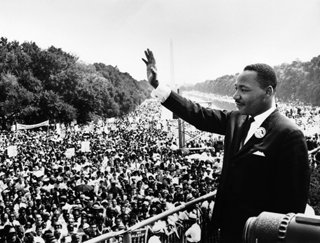Black History Month Feature:
Martin Luther King Jr. — A Legend in Human Rights
 Dr. Martin Luther King Jr.
Dr. Martin Luther King Jr.
Black History Month is an annual observance for the remembrance of significant people and events in African-American history. It is celebrated in February in the United States and Canada. Youth for Human Rights International celebrates Black History Month in honor of all of those whose courage and determination helped secure the civil rights millions enjoy today.
With many people unaware of their rights, the question arises: who will make sure human rights are respected? To answer, we can draw inspiration from those who made a difference and helped create the human rights we have today. These humanitarians stood up for human rights because they recognized that peace and progress can never be achieved without them. Each, in a significant way, changed the world.
As we review the prominent figures in Black history this month, a name that will forever remain in our minds is Dr. Martin Luther King, Jr., for his relentless crusade in the American Civil Rights movement that eventually led to greater rights and freedoms for many across the nation.
“I have a dream that my four little children will one day live in a nation where they will not be judged by the color of their skin but by the content of their character.” – Martin Luther King, Jr.
Born in Atlanta, Georgia, on January 15, 1929, Dr. King grew up with a firm education in theology, beginning with studies in sociology and a bachelor of divinity degree. He earned his Ph.D. in theology from Boston College in 1955. Like his grandfather and father before him, he was a Baptist minister and a man of faith.
It was during his early days of being a minister that Dr. King led the Montgomery Bus Boycott when Rosa Parks was imprisoned for refusing to give her seat to a white man, sparking a movement spanning over a decade.
Dr. King played a major role in many nonviolent protests in the American civil rights movement in the name of equal rights and desegregation, including numerous sit-ins conducted in response to segregation in Birmingham, Alabama. In fact, while in custody after participating in one of these sit-ins, he wrote his acclaimed “Letter from Birmingham Jail,” proclaiming that only by means of visible protest could progress be achieved and that this was part of a citizen’s duty.
These protests built up a vast momentum culminating in the March on Washington, on August 28, 1963, and Dr. King’s famous speech: “I have a dream that one day this nation will rise up and live out the true meaning of its creed: ‘We hold these truths to be self-evident: that all men are created equal.’ I have a dream that one day on the red hills of Georgia the sons of former slaves and the sons of former slave owners will be able to sit down together at a table of brotherhood.”
In 1963, Time Magazine named Dr. King Man of the Year, and in 1964, King became the youngest person ever honored with the Nobel Peace Prize.
From 1965 to 1968, King continued to lead the civil rights movement, continuing his efforts for desegregation across the U.S., and advocated against the Vietnam War.
On April 4, 1968, Dr. King was assassinated while speaking from the balcony at the Lorraine Motel in Memphis, Tennessee, a day after one of his most moving messages: “[God has] allowed me to go up to the mountain. And I’ve looked over. And I’ve seen the promised land. I may not get there with you.”
Thus, after a lifetime of forwarding human rights across America and creating vast impact worldwide, Martin Luther King, Jr., sparked a drive in us all that will continue to influence many generations and encourage forward progress for human rights so that every person may achieve equality.
Youth for Human Rights International is a nonprofit organization founded in 2001 to teach youth about human rights and inspire them to become advocates for tolerance and peace. Since its inception, it has grown into a global movement, including hundreds of groups, clubs and chapters around the world.
